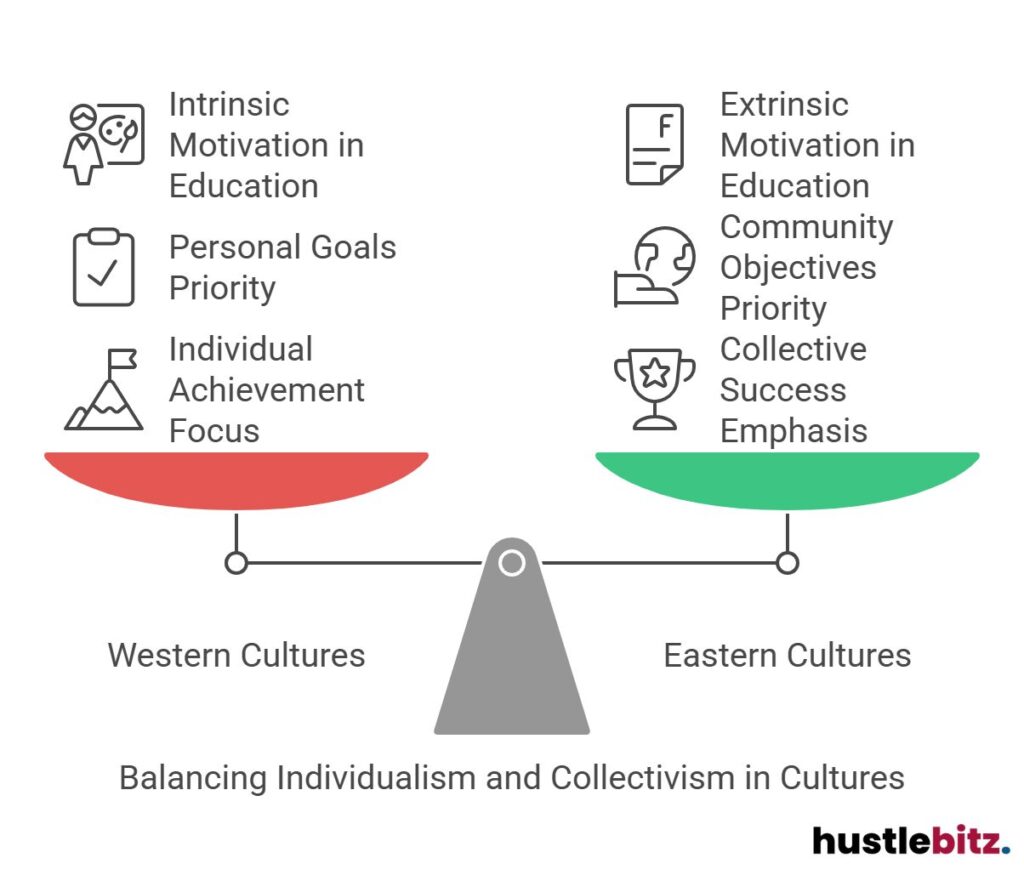Western and Eastern motivational styles are rooted in distinct cultural frameworks. Western cultures lean towards individualism, promoting personal achievement and self-fulfillment. This drives competitive environments where intrinsic motivation thrives. In contrast, Eastern cultures emphasize collectivism, focusing on group harmony and community success. Here, individuals are motivated by the desire to meet communal goals, often influenced by family expectations. While Western approaches favor intrinsic rewards, Eastern styles lean towards extrinsic recognition. Understanding these differences is essential for effective cross-cultural collaboration and engagement. Exploring further reveals how these motivational dynamics play out in various settings.
Key Takeaways
- Western motivation emphasizes individual achievement and personal goals, fostering competitive environments and self-directed learning.
- Eastern motivation prioritizes group harmony and collective success, driving individuals to contribute to community objectives over personal ambitions.
- Goal-setting in Western cultures focuses on individual success with SMART criteria, while Eastern cultures emphasize shared objectives and communal endeavors.
- Educational approaches differ: Eastern education relies on extrinsic motivators like grades, whereas Western education promotes intrinsic motivation through creativity.
- Workplace dynamics reflect these cultural differences, with Eastern settings rewarding team outcomes and Western organizations prioritizing individual achievements and personal development.

Core Differences and Similarities in Western and Eastern Motivational Approaches

In exploring the core differences and similarities in motivational approaches between Western and Eastern cultures, one can observe distinct values and beliefs that shape individuals’ drive and engagement in various contexts.
Western cultures often emphasize individualism, where personal achievement and self-actualization are paramount. This individualistic orientation fosters a competitive environment, motivating individuals to pursue goals that reflect personal aspirations and unique talents. Achievement motivation in Western societies is frequently characterized by a desire for personal success and recognition, leading individuals to prioritize their ambitions.
Conversely, Eastern cultures are predominantly influenced by collectivism, which emphasizes the importance of group harmony and social interdependence. In these societies, individuals are motivated to achieve not only for personal gain but also to benefit their community and family. This cultural influence shapes the way achievement motivation manifests, often prioritizing group goals over individual aspirations.
Cultural dimensions theory highlights these differing motivational styles, illustrating how cultural values can dictate the mechanisms of motivation. While both cultures recognize the importance of achievement, the motivations driving individuals vary significantly.
In essence, while Western approaches lean towards fostering personal autonomy and self-driven goals, Eastern perspectives advocate for a collective ethos, where success is often shared and celebrated within the community.
Understanding these core differences and similarities provides valuable insights into how cultural backgrounds influence motivational dynamics across diverse environments.
The Role of Individualism in Western Motivation

Individualism plays a pivotal role in shaping motivation within Western cultures, driving individuals to prioritize personal goals and self-fulfillment over collective interests. This emphasis on autonomy fosters a motivational environment where personal achievement is celebrated, often leading to increased self-esteem and satisfaction. In contrast to collectivist cultures, where group harmony and shared success are paramount, Western culture encourages individuals to carve their own paths and strive for unique accomplishments.
The cultural differences inherent in individualism manifest in various motivational strategies. For instance, Western individuals may be more inclined to engage in self-directed learning, set personal benchmarks, and seek recognition based on individual performance. Such approaches highlight the significance of autonomy in motivating individuals to push boundaries and achieve their aspirations.
The following table illustrates key aspects of individualism in Western motivation:
| Aspect | Description |
| Focus | Personal goals and self-fulfillment |
| Autonomy | High value placed on independence |
| Achievement Orientation | Emphasis on personal success |
| Recognition | Individual accolades and rewards |
| Motivation Source | Intrinsic drive and personal ambition |
Collectivism and Its Influence on Eastern Motivational Practices

Collectivism significantly shapes motivational practices in Eastern cultures by emphasizing group harmony and collective success over individual achievements. In environments where collectivism prevails, individuals are motivated to contribute to the group’s objectives, often prioritizing the needs of the community above their personal goals. This cultural lens fosters a sense of belonging and interdependence, where success is measured through collective outcomes rather than individual performance.
Eastern cultures demonstrate significant individual differences in motivational practices, as these practices are deeply intertwined with societal values and norms. For instance, the motivation to excel in educational settings is often driven by familial expectations and the desire to uplift one’s family status, reflecting a commitment to the collective good. This contrasts sharply with more individualistic cultures, where personal ambition typically takes precedence.
In various cultural contexts, the approach to motivation can also affect workplace dynamics. Team-oriented tasks are common, fostering collaboration and mutual support among colleagues. This alignment with collectivism not only enhances motivation but also strengthens group cohesion, as members work towards common goals.
Leaders in Eastern cultures often adopt a nurturing role, guiding their teams while ensuring that the contributions of each individual are recognized within the collective framework.
Comparing Goal Setting in Western and Eastern Cultures
Goal setting practices vary significantly between Western and Eastern cultures, reflecting distinct values and approaches to motivation.
In Western cultures, goal setting is often characterized by individualism, where personal achievement and self-actualization take precedence. Individuals are encouraged to set specific, measurable, achievable, relevant, and time-bound (SMART) goals, focusing on personal success and competitive advancement. This approach fosters a sense of autonomy and motivates individuals to pursue their ambitions independently.
Conversely, Eastern cultures typically embrace a collectivist orientation in their goal-setting practices. Here, the emphasis is placed on group harmony and shared objectives, often resulting in goals that reflect the interests of the community or family rather than individual desires. In these cultures, motivational styles prioritize collaboration and interdependence, leading to a more holistic approach to achievement. Goals may be set with consideration for how they benefit the group, reinforcing social bonds and collective well-being.
This divergence in goal setting not only illustrates the broader themes of individualism versus collectivism but also highlights how cultural values shape motivational styles. While Western cultures may view goal attainment as a personal journey, Eastern cultures often perceive it as a communal endeavor.
Understanding these differences is crucial for fostering effective communication and collaboration in diverse environments, enabling individuals to navigate and appreciate varying motivational landscapes.
The Impact of Societal Expectations on Motivation Across Cultures

Societal expectations play a pivotal role in shaping motivational dynamics across diverse cultures, influencing how individuals pursue their aspirations and respond to external pressures.
In individualistic societies, such as those commonly found in the West, motivation is often driven by personal goals and self-fulfillment. Individuals are encouraged to prioritize their ambitions, with societal norms reinforcing the value of autonomy and personal achievement. This framework fosters a competitive environment, where success is measured by individual accomplishments and the pursuit of personal happiness.
Conversely, in collectivistic cultures, prevalent in many Eastern societies, societal expectations emphasize community, family, and group harmony. Motivation in these contexts is heavily influenced by the desire to meet the expectations of others, such as family members and community leaders. Individuals are often motivated by the need to contribute to the welfare of the group, with personal aspirations taking a back seat to collective goals. This interconnectedness can lead to a sense of obligation, where success is defined not just by individual achievements, but by how well one fulfills societal roles and responsibilities.
Understanding the impact of societal expectations on motivation requires a cultural perspective that recognizes these differences. By acknowledging the interplay between societal norms and motivational strategies, we can appreciate how cultural contexts shape the way individuals navigate their aspirations and respond to the pressures that arise within their unique environments.
This understanding is essential for fostering cross-cultural interactions and enhancing global collaboration.
Intrinsic vs. Extrinsic Motivation: A Cultural Comparison
Motivational dynamics are frequently influenced by cultural contexts, leading to distinct preferences for intrinsic or extrinsic motivation among individuals.
In Eastern cultures, the emphasis is often placed on communal goals and the collective good, which can foster a stronger inclination toward extrinsic motivation. Conversely, Western cultures tend to value individualism, promoting intrinsic motivation where personal satisfaction and self-fulfillment are prioritized.
To illustrate the differences between intrinsic and extrinsic motivation in these cultural contexts, consider the following key factors:
- Cultural Values: Eastern cultures typically emphasize harmony and group cohesion, making extrinsic rewards, such as recognition from peers or adhering to societal expectations, more prevalent. In contrast, Western cultures value autonomy and individual achievement, leading to a greater focus on intrinsic rewards, such as personal growth and self-determination.
- Educational Approaches: In Eastern education systems, extrinsic motivators, such as grades and parental approval, are often emphasized, which can influence students’ motivation levels. Meanwhile, Western education tends to encourage intrinsic motivation by promoting creativity and critical thinking, allowing students to pursue their interests.
- Workplace Dynamics: In the workplace, Eastern cultures may incentivize team-based outcomes and collective success through extrinsic rewards, whereas Western organizations often prioritize individual achievements, fostering intrinsic motivation through opportunities for personal development and innovation.
Understanding these cultural nuances is crucial for effectively engaging individuals from diverse backgrounds and enhancing motivation across various contexts.
Final Thoughts
Understanding the differences between Western and Eastern motivational styles is crucial for fostering effective cross-cultural communication and collaboration. While Western cultures often emphasize individualism and intrinsic motivation, Eastern cultures prioritize collectivism and extrinsic motivation. By recognizing and appreciating these cultural distinctions, we can create environments that respect and integrate diverse motivational approaches, leading to more harmonious and productive interactions. Embracing this cultural awareness not only enhances personal and professional relationships but also contributes to a more inclusive global perspective.




